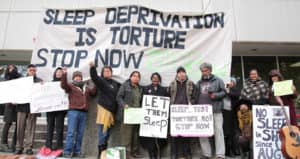by Prisoner Hunger Strike Solidarity Coalition Committee to End Sleep Deprivation and California Families Against Solitary Confinement Family Unity Network

Are you living in segregated housing – SHU, Ad-Seg, PSU, Condemned Units?
Are correctional officers coming around to your cell every half hour or hour to conduct security/welfare checks?
Are these checks conducted in a quiet manner? Or do these checks disturb you? Do they interfere with your ability to sleep, or cause physical or mental health problems?
As you may know, the court in Coleman v. Brown has ordered “security/welfare checks” every 30 minutes in all solitary units as “suicide prevention.” The order does not direct how the checks should be conducted, only their frequency and location.
The PHSS Committee to End Sleep Deprivation had hoped that the letters by many prisoners written since May 2016 to the Coleman Special Master and suicide expert explaining that the checks are disturbing their sleep and/or having a negative effect on their physical and mental health would influence a change of the court order, but no such change has occurred yet.
The court in Coleman v. Brown has ordered “security/welfare checks” every 30 minutes in all solitary units as “suicide prevention.” The order does not direct how the checks should be conducted, only their frequency and location.
The court has the authority to change the order for “security/welfare checks” (with Guard One System) in a number of ways. The PHSS Committee to End Sleep Deprivation and California Families Against Solitary Confinement (CFASC) and Family Unity Network realize that it is easier for court officials to ignore letters about the checks than to ignore 602s and written requests for medical or mental health treatment related to the checks.
If you are experiencing negative effects from the checks or from the way they are being conducted, it is time for the official record to reflect those effects. We hope that the attorneys for the prisoners in Coleman will take the 602s and medical requests seriously and address, with the court, the documented harms the checks are causing.
Past complaints resulted in the checks at the Pelican Bay SHU being reduced from every half hour to every hour at night (First Watch). Further reductions or other changes are possible there and at other prisons, but it will require new complaints being filed by a significant number of prisoners.
Since the architecture and/or officer behavior in the various kinds of segregated housing units can be different, it is important that a significant number of prisoners in each housing unit complain of these problems where they occur. The court is not likely to order statewide changes if there are problems at only a few prisons. The court is most likely to modify the order for those units where large numbers of people complain.
If you are experiencing negative effects from the checks or from the way they are being conducted, it is time for the official record to reflect those effects.
Prisoners often feel that filing 602s is pointless. It often seems that way. However, when prisoners act together, either by filing group 602s or by filing many 602s on the same issue in the same time period, that organized effort is heard. In contrast, courts interpret the lack of formal complaints as the lack of a problem.
We appreciate hearing from those who have already written us about this problem. Your responses to surveys, letters to the Coleman suicide expert and Special Master, and previous 602s about the checks have been important. The PHSS Committee to End Sleep Deprivation uses your words and information to spread awareness to the public, the Legislature, and the media. We compile the information as an ongoing record.
If you have grounds to file a 602 and decide to file one, we recommend that you give your 602 to an officer with a CDCR Form 22 asking the officer to deliver the grievance to the Appeals Coordinator. The officer’s signature on the 22 form is your proof that you delivered your 602 for filing.
Please include in your 602: whether you are able to sleep while Guard One is in use; as many details as you can recall about how often you usually wake up; how long you sleep at a time; how long you are awake each time you wake up; how much total sleep you get each night; and any consequences of this lack of sleep.
Request to see medical if you are experiencing negative effects from the checks or from related lack of sleep. Document in your 602s your medical visits and your attempts to get medical visits and medical care. Explain what medical did or did not do to help you, or if you were denied medical visits.
If you have grounds to file a 602 and decide to file one, we recommend that you give your 602 to an officer with a CDCR Form 22 asking the officer to deliver the grievance to the Appeals Coordinator.
If you have submitted 602s in the past about the checks, and the checks are still a problem for you, submit a new 602 (and Form 22) and request to see medical. Please send us a copy of your previous 602 as well.
The PHSS Committee to End Sleep Deprivation and CFASC/Family Unity Network want to help prisoners pursue this grievance. By the end of November 2017, please send by legal mail a copy of any new 602 (and 22 form) on this issue, any new medical or mental health documents showing that you have submitted a complaint and sought treatment, and any previous 602s you filed on this issue, to: Carol Strickman, Senior Staff Attorney, Legal Services for Prisoners with Children, 1540 Market St., Suite 490, San Francisco, CA 94102.
If you have created any artwork about the “security/welfare checks,” please send a copy to PHSS Committee to End Sleep Deprivation, P.O. Box 5692, Eureka, CA 95502.
Learn more at https://prisonerhungerstrikesolidarity.wordpress.com/tag/california-families-against-solitary-confinement-cfasc/.





